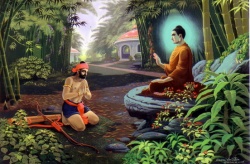Difference between revisions of "Miao-lo"
| Line 4: | Line 4: | ||
[[妙楽]] (711–782) (PY [[Miaole]]; Jpn [[Myoraku]]) | [[妙楽]] (711–782) (PY [[Miaole]]; Jpn [[Myoraku]]) | ||
| − | Also known as [[Chan-jan]]. The [[sixth patriarch of the T'ient'ai school]] in [[China]], in the [[tradition]] that counts [[T'ient'ai]] as the first [[patriarch]]. Another [[tradition]], which regards [[Nagarjuna]] as the founder, counts [[Miao-lo]] as the [[ninth patriarch]]. He is revered as the restorer of the [[T'ient'ai]] school. He was called the [[Great Teacher]] [[Miao-lo]] because he lived at [[Miao-lo-ssu]] [[temple]], or the [[Venerable]] [[Ching-hsi]] (also the [[Great Teacher]] [[Ching-hsi]]) after his birthplace. Born to a {{Wiki|Confucian}} [[family]], at age twenty [[Miao-lo]] studied the [[doctrine]] of the [[T'ient'ai school]] under its [[fifth patriarch]], [[Hsüan-lang]]. In 748 he entered the priesthood. At that [[time]], the [[Zen]] ([[Ch'an]]), [[Flower Garland]] ([[Hua-yen]]), [[Dharma Characteristics]] ([[Fa-hsiang]]), and other schools were flourishing, and the [[T'ient'ai school]] was in a slight {{Wiki|decline}}. [[Miao-lo]] reasserted the supremacy of the [[Lotus Sutra]] and wrote commentaries on [[T'ient'ai's]] major works, helping clarify and bring about a revival of [[interest]] in the school's teachings. He maintained the {{Wiki|superiority}} of the [[T'ient'ai]] teachings over the [[doctrines]] of other schools. In his later years, he lived at [[Kuo-ch'ing-ssu]] [[temple]] and [[died]] at [[Fo-lung]] [[Monastery]], both on [[Mount T'ient'ai]]. His commentaries on [[T'ient'ai's]] three major works are titled The Annotations on "The [[Profound Meaning of the Lotus Sutra]]," The Annotations on "The [[Words and Phrases of the Lotus Sutra]]," and The Annotations on "[[Great Concentration and Insight]]." | + | Also known as [[Chan-jan]]. The [[sixth patriarch of the T'ient'ai school]] in [[China]], in the [[tradition]] that counts [[T'ient'ai]] as the first [[patriarch]]. Another [[tradition]], which regards [[Nagarjuna]] as the founder, counts [[Miao-lo]] as the [[ninth patriarch]]. |
| + | |||
| + | He is revered as the restorer of the [[T'ient'ai]] school. | ||
| + | |||
| + | He was called the [[Great Teacher]] [[Miao-lo]] because he lived at [[Miao-lo-ssu]] [[temple]], or the [[Venerable]] [[Ching-hsi]] (also the [[Great Teacher]] [[Ching-hsi]]) after his birthplace. | ||
| + | |||
| + | Born to a {{Wiki|Confucian}} [[family]], at age twenty [[Miao-lo]] studied the [[doctrine]] of the [[T'ient'ai school]] under its [[fifth patriarch]], [[Hsüan-lang]]. | ||
| + | |||
| + | In 748 he entered the priesthood. At that [[time]], the [[Zen]] ([[Ch'an]]), [[Flower Garland]] ([[Hua-yen]]), [[Dharma Characteristics]] ([[Fa-hsiang]]), and other schools were flourishing, and the [[T'ient'ai school]] was in a slight {{Wiki|decline}}. | ||
| + | |||
| + | [[Miao-lo]] reasserted the supremacy of the [[Lotus Sutra]] and wrote commentaries on [[T'ient'ai's]] major works, helping clarify and bring about a revival of [[interest]] in the school's teachings. | ||
| + | |||
| + | He maintained the {{Wiki|superiority}} of the [[T'ient'ai]] teachings over the [[doctrines]] of other schools. | ||
| + | |||
| + | In his later years, he lived at [[Kuo-ch'ing-ssu]] [[temple]] and [[died]] at [[Fo-lung]] [[Monastery]], both on [[Mount T'ient'ai]]. | ||
| + | |||
| + | His commentaries on [[T'ient'ai's]] three major works are titled The Annotations on "The [[Profound Meaning of the Lotus Sutra]]," The Annotations on "The [[Words and Phrases of the Lotus Sutra]]," and The Annotations on "[[Great Concentration and Insight]]." | ||
</poem> | </poem> | ||
{{R}} | {{R}} | ||
Latest revision as of 01:02, 11 April 2015
Miao-lo
妙楽 (711–782) (PY Miaole; Jpn Myoraku)
Also known as Chan-jan. The sixth patriarch of the T'ient'ai school in China, in the tradition that counts T'ient'ai as the first patriarch. Another tradition, which regards Nagarjuna as the founder, counts Miao-lo as the ninth patriarch.
He is revered as the restorer of the T'ient'ai school.
He was called the Great Teacher Miao-lo because he lived at Miao-lo-ssu temple, or the Venerable Ching-hsi (also the Great Teacher Ching-hsi) after his birthplace.
Born to a Confucian family, at age twenty Miao-lo studied the doctrine of the T'ient'ai school under its fifth patriarch, Hsüan-lang.
In 748 he entered the priesthood. At that time, the Zen (Ch'an), Flower Garland (Hua-yen), Dharma Characteristics (Fa-hsiang), and other schools were flourishing, and the T'ient'ai school was in a slight decline.
Miao-lo reasserted the supremacy of the Lotus Sutra and wrote commentaries on T'ient'ai's major works, helping clarify and bring about a revival of interest in the school's teachings.
He maintained the superiority of the T'ient'ai teachings over the doctrines of other schools.
In his later years, he lived at Kuo-ch'ing-ssu temple and died at Fo-lung Monastery, both on Mount T'ient'ai.
His commentaries on T'ient'ai's three major works are titled The Annotations on "The Profound Meaning of the Lotus Sutra," The Annotations on "The Words and Phrases of the Lotus Sutra," and The Annotations on "Great Concentration and Insight."
